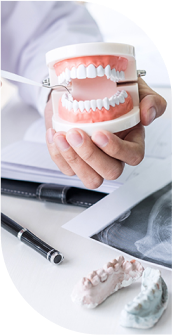- Call Now 416-679-1900

Aviva Dental is the place for you and your family to go for all dental services in Etobicoke. While focusing on giving our customers beautiful smiles and providing healthy oral practices, we strive to educate our customers on dental hygiene and the vitality of oral health. Aviva Dental prides itself on excellence, which is exemplified through our professional staff lead by Dr. Hothi. Whether it’s our dentists, front staff, or assistants; Aviva Dental in Etobicoke makes the promise of excellence in dental service and professionalism.
We accept all customers, no matter age, demographic or culture. Aviva Dental is an open door to anybody who is looking for outstanding dental practices. Our purpose at Aviva Dental is to provide exceptional services for our clients that leave you satisfied. We maintain a constant state of vigilance in our attempts to provide our patients with dental treatments of the highest quality.
Call Now : 416-679-1900




The idea is to detect minor issues early. For many individuals, this means getting a check-up every six months. Your dentist may recommend that you return more or less often depending on how well you care for your teeth and gums, any issues that need to be examined or addressed, the rate at which tartar accumulates on your teeth, and other factors.
The frequency with which you require x-rays is also determined by your dental health. A healthy adult who hasn't had cavities or other dental issues in a few years is unlikely to need x-rays at every checkup. If your dental condition is less stable and your dentist is tracking your progress, you may need more regular x-rays. If you are unsure why an x-ray is being done, see your dentist. Remember that dental x-rays emit very little radiation; they are an important tool for your dentist to prevent minor issues from becoming major ones.
Buy a toothbrush with gentle bristles. Medium and hard ones might harm teeth and gums. Apply mild pressure for 2 minutes, twice a day. Both powered and manual toothbrushes clean teeth well. Manual brushes with various bristle heights or angled bristles clean more effectively than ones with just flat, level bristles. Powered toothbrushes may be more convenient if you have difficulty using your hands.
It is impossible to avoid the necessity to floss your teeth on a regular basis. It removes food and plaque from between the teeth and below the gumline. If you don't, plaque hardens into tartar, which creates wedges and deepens the gap between your teeth and gums, resulting in pockets. Gums recede and teeth loosen with time. Waxed or unwaxed floss will do the trick. Using floss picks or interdental brushes is another simple solution.
Original dental records belong to the dentist who delivered the treatment, not the patient, since dentists are required by their provincial dental regulating body to maintain all of their records for a certain amount of time. Once you've decided on a new dentist, you may request that a copy of your records be moved from your previous dentist. You may be asked to sign a release form from your previous dental practice, and you may be charged an administrative fee to have your data duplicated and forwarded to another dental office. If you have any queries concerning the records transfer procedure in your province, see your dentist or the provincial dental regulating organization.
© Copyright AVIVA Dental All Rights Reserved.